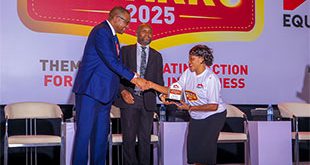
By Patrick Kagenda
The Independents Patrick Kagenda talked to Terry Kahuma, the Executive Director at Uganda National Bureau of Standards (UNBS) about the substandard and counterfeit goods on the Ugandan market.
What are you doing about the substandard and counterfeit goods flooding the Uganda market?
The first thing we try to do is to limit their entry. This means deploying competent officers at the border points though we don’t cover the entire country in terms of inspector’s presence. We are present at only 18 entry points whereas there are 52 entry points in total which are manned by Uganda Revenue Authority (URA). UNBS does not have the funds to man all the 52 entry points; we don’t have enough vehicles to transport samples to our headquarters for testing.
The laboratories are also limited so these samples queue up for analysis. You may find a queue going back several weeks. We also have inspectors who operate within the country, patrolling trading locations, shops, supermarkets and so on for substandard items.
Does Uganda have an anti-counterfeit law?
At the moment no. But there is one being developed. The law is at stages like cabinet review, parliamentary discussion, which are not under our control. We prepared a Bill in collaboration with the parliamentary council, law reform commission, our ministry of Trade Tourism and Industry and the many stakeholders.
What are your working relations with the URA?
We have extremely good relations with URA and I credit them for that. They house our staff at the various entry points and without URA I don’t even know how we would have been able to execute the level of performance that we have already. They even help us to store goods as we try to establish conformity status in our laboratory. We have never had challenges for example of being refused entry. We generally have a compliant import community.
What about the counterfeits?
That is because of lack of capacity by UNBS, lack of a sufficient stringent legal framework especially in terms of the penalties imposed on the goods. The commercial laws governing trade in this country in terms of standards and quality have to be strengthened. If the laws allowed extremely heavy penalties in hundreds of millions of shillings you would definitely see a remarkable decrease of these items. We need the help of the community, informers and so on. UNBS does not have the capacity of paying informers because URA has an arrangement where informers are paid a proportion corresponding to the taxes that the informers enable URA to recover. The other way is to implement pre-export verification for conformity.
Do you ever get interference from top government officials about goods you impound?
A lot of people assume that we come under the influence of big shots in government to release goods or to apprehend certain goods. It is very interesting but it does not happen. We act completely independently, though we are under general supervision of the ministry of Trade, Tourism and Industry.
Are counterfeits decreasing or increasing?
First I would like to make a correction. We don’t deal with counterfeits, what we deal with are the sub-standards. One must realise that although we intercept counterfeit goods regularly in big amounts, the influx also continues.
What border areas let in most of these goods?
The most porous areas are the borders with Kenya and Tanzania. We are talking about borders and not entry points because smuggling is another big contributing factor to the presence of counterfeit goods. A lot of the items don’t pass through border points or if they pass through the gazetted entry points, there is a way they can hide them. We need technology because there should be capacity to have X-ray based ways of examining the content of a lorry without offloading because that is what is available in some other countries. Not even URA has that technology.
What are the effects of the counterfeits on the nation?
The notable effect is that it has a drain on people’s incomes. Substandard goods are causing people to buy things over and over again. This is contributing to poverty directly and also frustration. Counterfeit items are extremely dangerous not only in terms of economic loss but they can also endanger the user’s life.
Do you have working relations with the mobile phone manufacturers to ensure that Uganda doesn’t become a dumping ground of look alike and fake phones?
The issue of manufacturing items under a stolen trade mark (counterfeiting) at the moment is not under UNBS jurisdiction. So we would not be able to successfully prosecute offenders under that category of offence. Ours is to do with substandard commodities however we don’t have standards for phones. That is something covered by the Telecommunications commission. However we do have a provision under the UNBS act to go against commodities not only which are substandard but which are also shoddy. Shoddy to us means goods not doing what they are supposed to do and with no mechanical integrity and no known fulfillment. We are in discussions with Nokia phone manufacturers in terms of how we can help them to remove these phones under that provision.
There are reports that some of your staff aid counterfeiters. How are you resolving this?
UNBS staff who aid counterfeiters if found out are punished. The national standards council will not hesitate punishing any official found to be undermining UNBS efforts and the economy at large. We have dismissed many staff and we will continue dismissing those implicated in the vice.
 The Independent Uganda: You get the Truth we Pay the Price
The Independent Uganda: You get the Truth we Pay the Price


